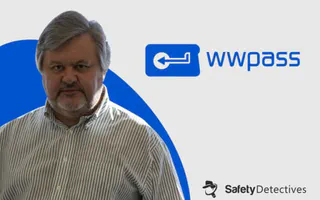Interview with WWPass CEO Shablygin
November 30, 2020 by Aviva Zacks

Safety Detective: Tell me about your journey to cybersecurity and what you love about it.
Eugene Shablygin: Cybersecurity was a pretty natural journey for me because I started my business career in general computing, and I came to the computer business from nuclear science, so I am a nuclear scientist by trade. But I was a very lazy nuclear scientist, and I didn’t like to solve the problems on paper, so I tried to outsource the solutions to these problems to computers.
Once the Soviet Union was no longer an entity, there were opportunities for private business, and I could leverage my knowledge of computers. I started a couple of companies selling personal computers, but back then we identified the need for high-performance workstations, and we teamed up with Sun Microsystems around 1991. I brought the first legal Sun Microsystems RISC system into Russia in the backseat of my car, which I drove all the way from Berlin to Moscow. Today this business is in the top 400 business enterprises in Russia.
In the mid-90s I moved to the US, and since then, my prime market became the US and Western Europe.
I worked on different projects with a lot of personal data, and I was always amazed by how poorly this data was protected, so I started thinking and as a scientist. I always tried to find an unorthodox solution for how to solve the problem of protecting personal and secret information so it cannot be cracked. It cannot be accessed without the permission of the owner by design, not by agreement.
SD: How did you get the idea for WWPass?
ES: Some of my ideas were generated about 20 years ago. We slowly tried them in a lab environment, and about 12 years ago, we decided to start the business utilizing this idea. That’s how WWPass started. We decided to develop a technology that is unique and allows people to take the possession of their secrets. Our business is still relatively new, and innovations are usually slow to find their way into the mainstream, but slowly but surely, we are gaining more and more interest and adoption of this technology. We believe that pretty soon people will be able to protect their personal information well and will forget about phishing and other things associated with very, very insecure methods of protecting information.
SD: What does your company do?
ES: In a few words, we are completely changing the login experience. We are freeing people from remembering complex passwords and divulging their usernames which are the first point for attack phishing.
We have a number of applications that support this approach. We have thousands of users across the globe who are implementing them in their systems. We helping people stop using usernames and passwords for good.
SD: What do you think are the worst cyberthreats today?
ES: It’s very difficult to identify which one is the most dangerous, but I think that leaking personal information and gaining access to the systems where you’re not supposed to access is the worst threat to the community because this unauthorized access can create a lot of damage, both for individuals and for businesses and for governments.
SD: Where do you think cybersecurity is headed now that we’re living through a pandemic?
ES: First of all, I think that cybersecurity is very much lagging. Companies that were faced the pressure to put their workforce into this home remote operations did this move very quickly in an emergency mode. When you do something quickly, you usually pay no attention to the secondary things because you feel like you need to survive today and reinforce your security sometime tomorrow because it’s very difficult to do both things at the same time. So today the security threats are getting much worse when they were before the COVID situation, and we are seeing a ten-fold increase of phishing attacks.